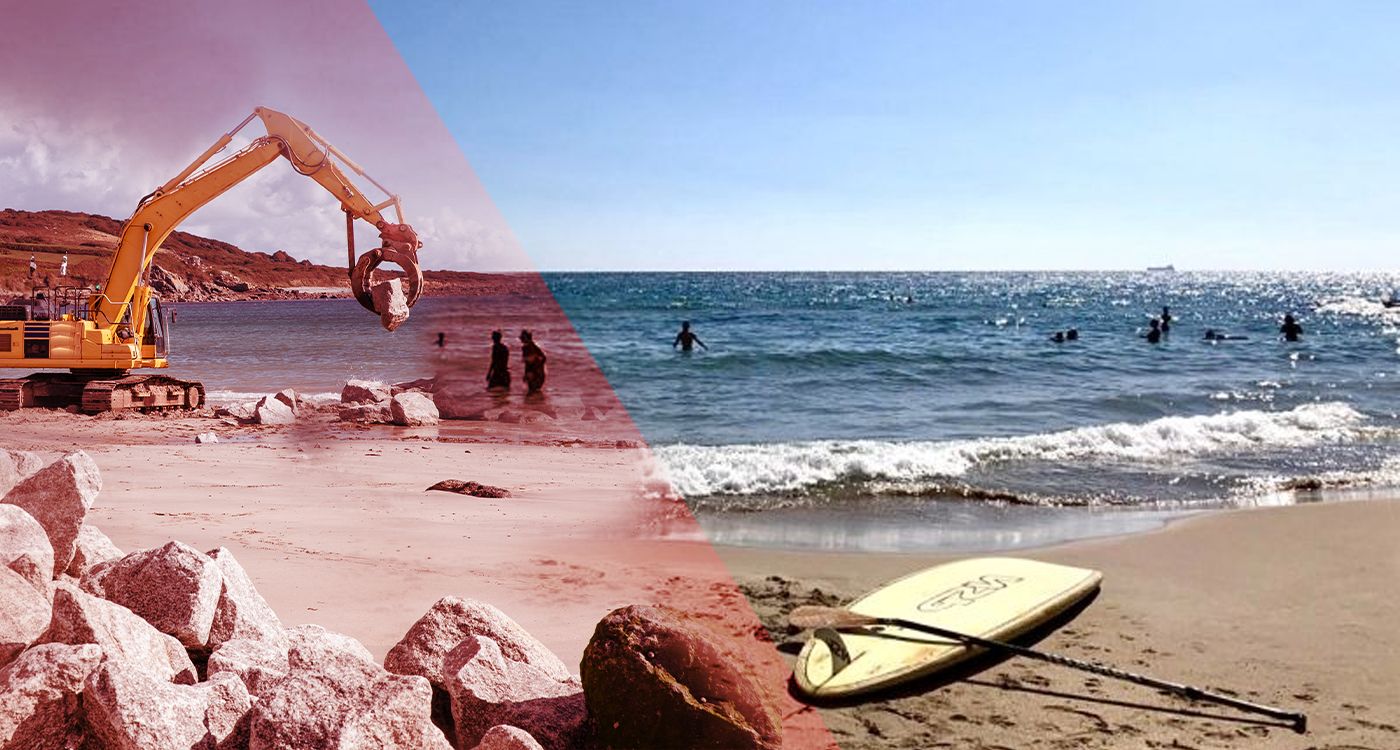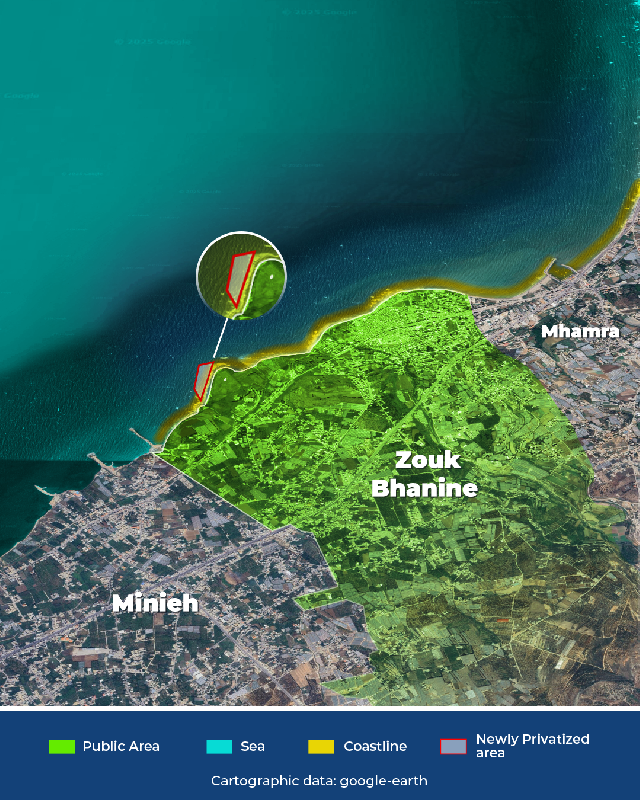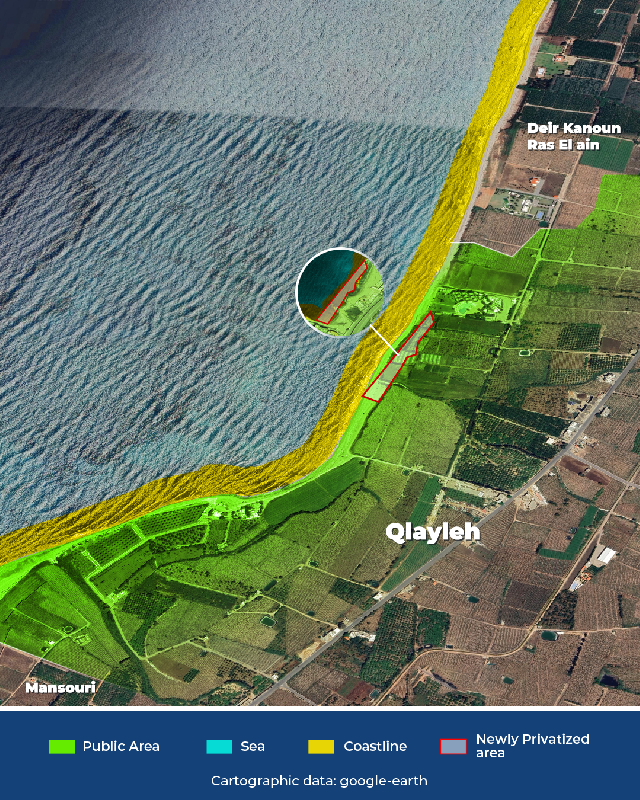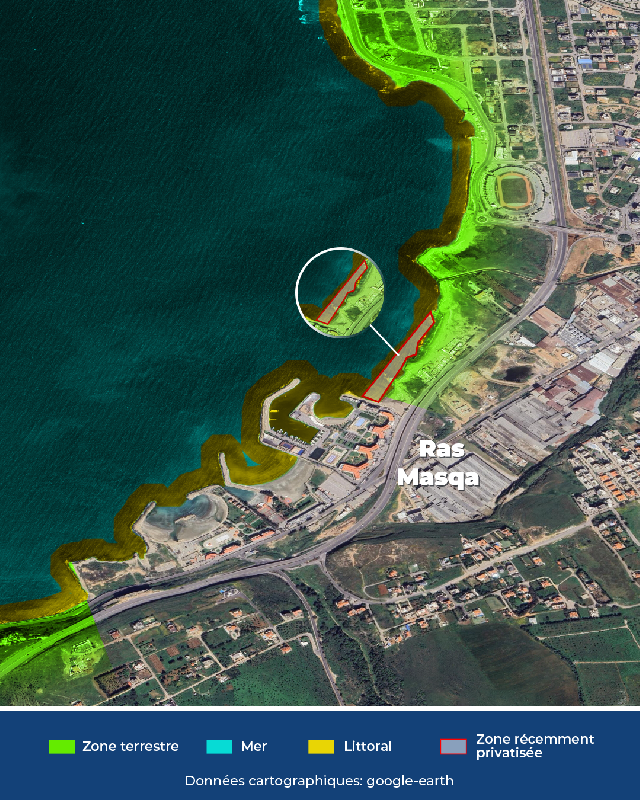
In the last cabinet session before the presidential election, caretaker Prime Minister Najib Mikati approved land reclamation projects privatizing 85,000 m² of public maritime land in northern and southern Lebanon.
This decision would accelerate coastal degradation, as only 20% of the coast remains public, according to architect and urban planner Jad Tabet.
It also poses significant environmental risks and threatens the nation’s right to public coastal access.
Yet, caretaker Minister of Environment Nasser Yassin endorsed it by signing the decrees.
The 85,000 m² of newly privatized maritime land is divided as follows:
- In northern Akkar’s Zouk Bhanine, two individuals received approval to develop a 53,305 m² plot to establish pipelines for a maritime route and create a docking area for ships.
- In Qlayleh, near Tyre, a project for a 14,560 m² plot was granted (Zouk Bhannine and Qlayleh sites are among the few coastal areas still open to the public).
- In Ras Maska (Koura), a resort of 59,140 m² was granted an expansion of 17,000 m².

The above map shows an estimated location of the newly privatized area in Zouk Bhanine, measuring 53,305m².
The above map shows an estimated location of the newly privatized area in Qlayleh, measuring 14560m².
The above map shows an estimated location of the newly privatized area in the Ras Masqa region, measuring 17000m².
Why Are the Land Reclamation Projects Illegal?
This is Beirut spoke with legal environment expert and PHD holder in environmental law, Josiane Yazbeck, to understand the legality of the three coastline projects.
“Approving these projects violates Environmental Protection Laws and international conventions for protecting the coast and the Mediterranean Sea,” Yazbeck said.
Yet, the decrees greenlighting the projects were published in the official gazette and became legally binding.
Revoking them would require the new government to withdraw the authorization granted by its predecessor through a decree to protect what remains of the Lebanese coastline.
Lebanese laws that mandate the preservation of the coastal strip were breached during the war due to illegal construction that continues to this day.
Even after the war, encroachments on public maritime land have continued and remain largely ignored by the authorities.
Aside from breaking Lebanese law, judicial procedures to obtain these decrees were ignored, suggesting they were rushed.
“Any decree impacting public maritime property must first be vetted by the Higher Council for Urban Planning. Yet, such review did not occur, and this can annul the decrees, even if they already went into effect,” she added.
Bypassing key environmental protection measures has further exacerbated these concerns, Yazbeck emphasized, noting that “Lebanese budget law stipulates that past violations (dating from 1975 to 1993) can only be legalized after conducting an Environmental Impact Assessment (EIA). This contradicts the very purpose of such assessments, which cannot be applied to pre-existing structures. To address this legislative error, the government is requesting environmental audits without amending the law, which is itself a violation of the law.”
In the case of Ras Maska, the decree was not submitted to the Higher Council for Urban Planning and relied solely on the environmental audit conducted for pre-existing structures, despite allowing the exploitation of an additional 17,000 m². As a result, this exploitation will proceed without an EIA.
Similar shortcomings are evident in Zouk Bhanine and Qlayleh, where mandatory EIAs have been reduced to mere formalities. They were required as part of the decree granting the permit, in contradiction with Decree No. 8633/2012 on Environmental Impact Assessment procedures.
Who Can Challenge the Land Reclamation Projects?
According to Yazbeck, the legal pathway to contest these decrees is fraught with obstacles.
“Under Lebanese law, challenges must be filed within two months after publication in the official gazette,” she noted.
“During this period, only those who can demonstrate direct harm—or who possess specific legal standing, such as neighboring property owners or individuals whose livelihoods are directly affected—can mount a case,” she added.
Although every citizen theoretically enjoys the right to a healthy environment and unfettered access to the coast, the court’s narrow interpretation of “legal standing” severely limits the pool of potential plaintiffs.
“Environmental organizations can challenge the decrees, but in the absence of explicit laws granting legal standing to NGOs, their success often depends on finding a judge who understands environmental issues and is willing to adopt a broader interpretation of legal standing,” affirmed Yazbeck.
This judicial conservatism makes the prospects for overturning the land reclamation projects uncertain at best.
Coastal Privatization: An Environmental and Socio-Economic Threat
“Converting coastal areas into private resorts or residential complexes risks destroying critical habitats, increasing pollution from sewage and solid waste, and reducing local biodiversity,” Manal Nader, Director of the Institute of the Environment at the University of Balamand, told This is Beirut.
“Land reclamation disrupts natural coastal currents, causing accelerated beach erosion and interfering with the sediment and nutrient flows essential to a healthy marine ecosystem,” he added.
Nader warns that this privatization is far more than an administrative change, it triggers a cascade of environmental damages that imperil both coastal ecosystems and the communities that depend on them.
“In the short term, habitat loss and pollution disrupt local food chains,” he cautioned.
“Over the long term, these practices could lead to irreversible biodiversity loss, habitat fragmentation and a breakdown in vital ecosystem functions.”
The socioeconomic fallout is equally troubling.
Restricting public access to the coast can deprive local businesses of valuable revenue, reduce municipal income from public amenities and drive up property values—further exacerbating social inequality.
“As privatized shorelines become exclusive enclaves, community cohesion weakens and recreational spaces that once supported small-scale fisheries and artisanal livelihoods disappear,” concluded Nader.
A Call for Integrated Coastal Zone Management
In response to these mounting challenges, experts like Nader and Yazbeck are advocating for Integrated Coastal Zone Management (ICZM).
This holistic approach seeks to balance sustainable development with environmental preservation by involving all stakeholders—from local communities to government agencies—in decision-making.
ICZM recognizes the interconnectedness of land and sea, promoting strategies that protect both natural and cultural assets while supporting economic growth.
The Takeaway
Despite laws designed to protect public maritime property, the recent land reclamation projects have set yet another dangerous precedent—one that threatens the nation’s coastal ecosystems, local economies and cultural heritage.
Approximately 1,068 violations have been reported along Lebanon’s coastline as of 2024, and this number is likely to increase if the government continues to profit from privatizing the coast while restricting the Lebanese people’s rightful access to safe and clean public beaches.
As the public’s right to access the shore is further eroded, the hope for sustainable and inclusive coastal management remains critical, though uncertain, for future generations.






Comments